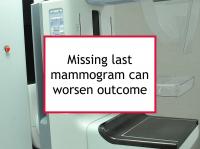Mammographic screening for early detection of breast cancer has been demonstrated to reduce breast cancer mortality by finding the disease at a more treatable stage than non-screen detected breast cancer. However, little is known about the consequences of skipping screening dates. Now a new study has reported that women who miss the mammogram before the mammogram that finds cancer can have worse outcomes.
False positives mammograms
There has been a great deal of concern reported regarding false positive mammograms and the unnecessary distress, diagnostic procedures, and cost they cause. In fact, false positives, in which women are recalled after a mammogram but are found not to have breast cancer after further tests, are common.
However, note that women who experience false positive recall have higher subsequent rates of breast cancer. In such cases, an abnormality seen during screening and determined to be benign turns out to have been the beginnings of breast cancer after all. One study reported that women with a history of false positive recall were at more than two times the risk of eventually being diagnosed with breast cancer than women who did not experience false positive recall.
Clearly there is room for improvement in diagnostic assessment. However, ideally, this should not discourage women from scheduling and undergoing regular mammograms. This is especially true for those who have experienced false positive recall.
Latest research finds skipping mammogram could worsen outcome
The prospective Swedish study referenced above was designed to investigate the consequences for women diagnosed with screen-detected breast cancer who did not respond to the last screening invitation before the mammogram that resulted in breast cancer diagnosis. The study included all of the 8,602 women diagnosed with screen-detected breast cancer in Stockholm between January 1995 and February 2020. The women were followed until year-end 2022.
A total of 1,482 (17%) of study participants failed to attend the last screening before the screening that led to diagnosis. These women were found to be more likely to have larger tumors, positive lymph nodes, and distant metastasis than women who kept to their screening schedule. They were also less likely to have estrogen receptor negative (ER-) breast cancer, but no differences were observed in progesterone receptor (PR) or ERBB2 (formerly HER2+ or HER2/neu) status. In addition, these women were found to experience worse breast cancer–specific survival. However, after adjusting for tumor characteristics, there was no significant association. Additionally, no association was found between nonparticipation in the second-to-last screening and tumor characteristics.
The authors conclude that some women with delayed screen detection of breast cancer due to missing the last screening before the one that led to diagnosis experience clinically relevant worse outcomes. Future research is needed to investigate whether moving forward the next mammography screening invitation date could improve breast cancer outcomes in this population, according to the authors.
Please see our article on screening mammograms and the mammogram tag for more information.
